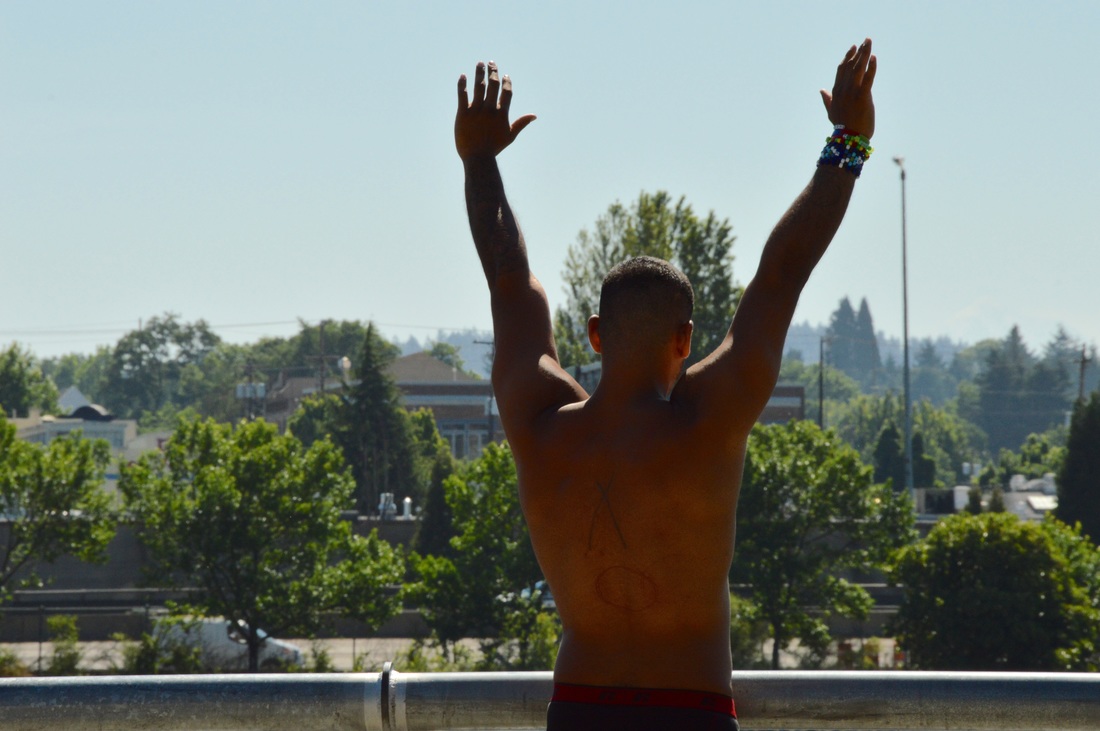|
The first time it was Charleston. I was leading a writing retreat halfway across the country, when I heard about the shooting. All the retreaters had followed my advice and sworn off email and Facebook for the week, so I was the only one who knew. I accidently let slip some vague comment about it to Kylie, a scholar of race and community development. When she asked me to explain, I refused and said, “Just don’t check the news.” Later, she told me that after the retreat, on the way home from the airport, she started crying so hard she had to pull the car over. The next time—almost a year later—it was Orlando. Kylie was at that retreat too. This time I was careful not to say anything at all. But I wondered if that was the right thing to do. To once again leave her to face it alone, crying in the car, on the way back home. I encourage scholars to leave the world behind, to shut it out and immerse themselves in their writing til they forget everything else. I help them figure out how to do that, whether they’re on retreat or in their office on a Thursday afternoon. But to look up from that hard-won reverie and find your world splattered with blood—what else can it do but make you question why you write? Why you labor so hard for this nothing of a book, this flutter of an article that no more than twelve people will read? Black lives matter. Writing doesn't. I think this but I don’t say it. * * * * * I’m at home when I find out about Alton Sterling and Philando Castille. The first hint is a one-line Facebook entry that, at the time, I don't understand, something about shit gettin’ crazy. Then the unrelenting trail of videos, frozen thumbnails of blooming blood and crimped grief and slack disbelief. I’m struggling to decide whether to watch them when I am saved by my former colleague Ronak Kapadia, who posts, “I should not have watched the video. No more space to consume the grief of others. No more space. I should not have watched the video.” So I don’t. But I moved last year from Chicago to the whitest big city in America. So I can’t stop myself from scrolling through the posts, thinking how wrong it is that this is called a “feed.” In one article, a woman asserts how great social media is at providing a platform for people to express their grief in times like these. And I suddenly understand why I hate Facebook so much and also cannot put down my phone. I can’t be alone. But I do not want an unfettered, unfiltered rain of emotion. I cannot handle my own. I certainly can't take in yours. I want, instead, your thoughtfully composed rage. Your analysis like a hunting knife lodged between the ribs of my enemy so that every one of his final breaths makes a whistling sound his children will never forget. I want your glittering confetti of fact to shower down on me and knit itself into an armor, lightweight, invisible, impenetrable, that I can take with me whenever I leave my home and pass the many police officers who work two blocks away. Write, for fuck’s sake, I think. I don’t give a shit how upset you are. If you don’t write, then I can’t read, and then what will I do? * * * * * But the next morning one of my weekly coaching clients emails her daily check-in. She’s in the office, ready to get started, but feels like writing "doesn't matter much" at the moment. Why write? she is asking her writing coach. Because I need you to is not the right answer, for her or for me. * * * * * Later that night, I order in and am walking to pick up dinner, when off to my left, I hear the faint sounds of a crowd. It trickles toward me at first, then streams through the street, billowing around cars, then closing behind them. They have Hands Up. They shout Don’t Shoot. And I stand on the corner, hand on my mouth, weeping as I wait for them to reach me. I am confused by my tears, unable to move and not sure why. As they reach my corner, a young dread at the front of the march sees me and turns to watch me as he passes. He walks backwards to hold my gaze, never stopping his chant. But he smiles at me. And with his Hands Up, he waves me toward him, in slow, even motions. Join us. * * * * * It isn’t until I get home from the march that I understand why tears were my first reaction. That protest was neither for me nor about me. But it felt like grace to be standing on a corner in my lily white city, and, to hear, faraway, the voices of people that will not be contained. To see bodies that will not yield. To be one heart aching on a corner alone. Then, in an instant, become one of a hundred, and then a thousand. I’d known I was unmoored, but to be honest, I’d spent most of my energy tamping down my emotions rather than actually feeling them: should I watch the video? Can I tolerate this post? How badly will that article piss me off? Endless internal debate over what I could handle. All designed to skirt the feelings coiling up inside me. But walking through the streets in a wave of similarly heartsick people gave me a container for those feelings. It loosened up whatever was stuck and gave me a way—not to dump my emotions, or escape them. But to sit in them. To let them wash over me without letting them wash me away. * * * * * And now I can write. Not because I’m disciplined. Not because it matters. But because writing is one way I make the container that lets me tolerate this world. It’s also how I work to change the world we have into the world I want to live in. So don’t worry if your research seems pointless right now. Or all-consuming. Or indulgent. Or even all these things at once. Instead, go out and find yourself the container that can hold each of those feelings, and any others you may be having. This article describes a simple way to pair up with someone you trust to do that. But if that doesn’t work for you, then find another way. The one that works for you. It might not seem like you know what it is, but you do. I have a key so I open the door and walk in. It is dark and I walk in. It is darker and I walk in.* Making your container might take longer than you want it to. Like me, you may have forgotten what yours looks like. You may worry that what you have to put inside is even uglier than you imagined. But make it anyway. That’s your one and only obligation right now. Make it, so you’re not trapped by whatever’s roiling around inside you. Make it, step inside it, and stay as long as you need to. When you’re ready, step back out. And return to whatever constitutes your work in this world. *from "Seven Poems" by Mark Strand * * * * * * * * * * * Many thanks to… Ronak Kapadia, for helping me decide. Mindi Thompson, for making me eat lunch. Karin Dancy, for the moon pie. Deborah Paredez, for the poem. And for poetry. Want the monthly InkWell blog delivered straight to your inbox? Subscribe to Inkling, a bite-sized, monthly newsletter filled with ideas, inspiration, and information for academic writers.
stacey gibson
7/9/2016 11:19:44 am
Yes, Michelle Boyd. Without apology, and with ferocity, YES!
Michelle Boyd
7/9/2016 11:24:59 am
Thank You Stacey!!! It is good to hear from you and good to hear these words from you. You will understand what I mean when I say this one wrote itself and I had to figure out how to hang on for the ride. I'm SO glad it resonated.
Liesl
7/9/2016 12:38:28 pm
I want everyone I know to read this. What you do with words never ceases to amaze and move me.
Michelle Boyd
7/9/2016 12:41:36 pm
Leisl, I clearly used up all my facility with words. Because I'm having a hard time expressing my gratitude for your comment. So I'll stick with Thank. You.
Michelle
11/7/2018 12:34:33 pm
Many, many thanks Sara! I hate that there’s a reason to write something like this. But delighted it spoke to you.
Ellen
11/10/2018 09:59:21 am
Wonderful piece. It is clarifying and inspiring. I appreciate that you recirculated it. Not everything we put out needs to be brand new.
Michelle
11/12/2018 11:13:39 am
Thanks Ellen--I had to have 5 conversations with myself before I could convince myself to repost it, so I'm glad it was helpful, even when you've already read it before. Comments are closed.
|
|
© 2018 InkWell Academic Writing Retreats
|

